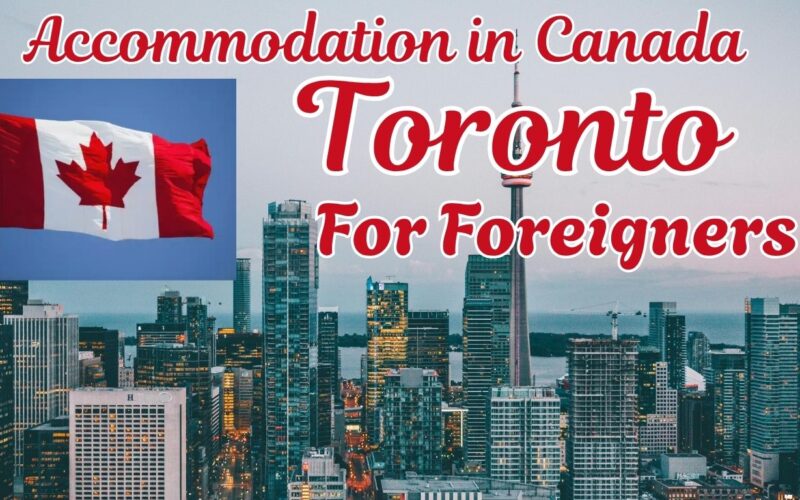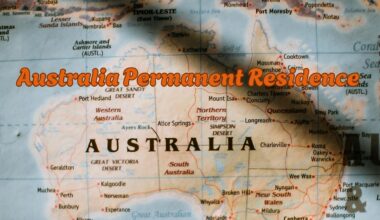Interested in affordable accommodation in Canada Toronto for foreigners?
Here are list of affordable accommodation in Canada Toronto and guidelines to secure them.
Toronto is the bustling, multicultural heartbeat of Canada and has been a magnet for dreamers, students, and professionals from around the world.
Its skyline shimmers over Lake Ontario, its neighborhoods pulse with energy, and its streets echo with hundreds of languages.
But if there’s one thing every newcomer quickly learns, it’s that finding the right accommodation in Canada Toronto.
Getting a right accommodation in Canada Toronto is both an exciting and challenging part of settling into this incredible city.
If you’re coming as a student ready to go into your studies or as a worker chasing better career opportunities, your living situation can shape your entire Toronto experience.
From cozy shared rooms to high-rise condos, every corner of Toronto offers something unique.
But knowing what suits your lifestyle and budget is the real secret.
In this post, we will explain how Toronto’s housing market works, the best accommodation options for students and workers, what rents truly look like, and smart tips to make your search smoother.
Understanding Toronto’s Housing Landscape
Toronto’s housing scene is one of the most dynamic in North America.
Demand is high, rent prices fluctuate constantly, and location determines almost everything from your monthly expenses to your commute time.
For international arrivals, it can feel overwhelming at first, but once you understand how the system works, finding accommodation in Canada Toronto becomes easier.
The city is divided into vibrant zones, each with its own personality.
Downtown Toronto including neighborhoods like Queen Street West, Yonge Street, and the Financial District is lively and central but expensive.
Renters pay more to be close to universities, offices, entertainment, and subway lines.
Midtown Toronto, home to areas like The Annex, Davisville, and Forest Hill, offers a mix of older apartment buildings and trendy condos, appealing to both students and young professionals.
On the other hand, suburban areas such as Scarborough, Etobicoke, and North York are more affordable and popular with newcomers looking for space, quiet, and better value for money.
Public transportation through the Toronto Transit Commission (TTC) makes commuting manageable.
Many people live outside downtown but rely on the subway, streetcars, and buses to get to school or work efficiently.
Another factor shaping Toronto’s housing market is demand from newcomers.
Thousands of students and immigrants arrive each year, which keeps competition high.
Especially during summer and early fall when school terms begin. This is why starting your housing search early is crucial.
Accommodation Options for Students
Finding student housing in Toronto can be both exciting and nerve-racking.
Students often need affordable, safe, and accessible places close to their campus.
Here are some of the best accommodation types for international students especially Nigerians and Africans studying in Toronto.
1. On-Campus Residences
If you’re studying at institutions like the University of Toronto, Toronto Metropolitan University (formerly Ryerson), or York University, on-campus residences are the easiest option.
They come fully furnished, include utilities, and often provide meal plans.
The best part of it is that you’re surrounded by fellow students, making it easier to form friendships and integrate quickly.
Prices range between CAD 1,200 – 1,800 per month, depending on the school and room type.
Most universities allocate limited spaces, so applying early is key.
Living on campus also helps you focus better academically without the stress of long commutes or high transportation costs.
2. Shared Apartments or Rooms
Many international students choose shared apartments around neighborhoods like The Annex, Kensington Market, and Little Italy.
Renting a single room in a shared apartment typically costs CAD 900 – 1,300 per month, depending on how close you are to downtown.
The benefit here is cost-sharing, utilities, internet, and sometimes groceries are divided among roommates.
It’s also a social environment that makes adjusting to Toronto life more enjoyable.
3. Homestays
Homestays are a warm option for newcomers who want a family environment.
You live with a local Canadian family, get your own furnished room, and often receive two or three meals daily.
It’s a great way to practice English and understand Canadian culture firsthand.
Average homestay costs range between CAD 1,100 – 1,400 per month, depending on the location and services included.
Many international students find this the easiest option during their first year in Canada because it provides stability and emotional comfort.
4. Student Co-Living Spaces
Toronto now offers modern co-living options like Parkside Student Residence or Campus-One.
These places combine private bedrooms with shared amenities such as lounges, gyms, and laundry facilities.
Think of it as hotel-style living designed for students.
Prices range from CAD 1,500 – 2,200 per month, but the convenience, security, and sense of community make it worthwhile.
5. Private Rentals Near Schools
Some students prefer to rent small studios or one-bedroom apartments near their schools, especially in Spadina, Bloor Street, or Eglinton West.
This option is perfect for those seeking privacy and independence.
The rent can go from CAD 1,800 – 2,400 monthly, depending on amenities and location.
For students balancing part-time work and studies, being close to public transport and grocery stores is an essential factor when choosing housing.
Accommodation Options for Workers
For professionals and skilled workers, Toronto’s housing priorities differ slightly from students.
You want something comfortable, safe, and ideally near your workplace.
Your budget, job stability, and family situation also influence your choice.
Here are the main accommodation options that fit working individuals and families.
1. Condos and Apartments
Downtown condos in places like Bay Street Corridor, Entertainment District, and Yonge-Eglinton are prime choices for workers.
These buildings usually come with modern kitchens, in-unit laundry, gyms, and 24-hour security.
Average rents for one-bedroom condos range between CAD 2,400–2,800 per month, while two-bedroom options can reach CAD 3,000–3,800 depending on the view and location.
For those working in corporate or tech industries, condos provide both comfort and convenience.
You can walk to work, access subway lines easily, and enjoy the downtown buzz after hours.
2. Basement Apartments
Basement apartments are extremely popular among newcomers seeking affordable accommodation in Canada Toronto.
They’re often found in residential neighborhoods like Scarborough, Etobicoke, and North York.
You get a private entrance, kitchen, and washroom at a lower cost than upper-level apartments.
Rent for basement units typically ranges between CAD 1,200 – 1,700 per month.
The downside is limited natural light or lower ceilings, but many units are renovated and quite cozy.
For single workers or couples on a tight budget, it’s a great way to live independently without spending too much.
3. Shared Housing or Co-Living Spaces
Some professionals, especially those new to Toronto, prefer shared apartments with other working adults.
Co-living setups in areas like Liberty Village or Danforth provide furnished rooms, shared kitchens, and communal lounges.
Monthly rent can range from CAD 1,000 – 1,500, depending on the setup.
This choice helps newcomers network and build friendships quickly while saving on utilities.
4. Short-Term Rentals
If you’ve just arrived and need temporary housing while job-hunting or waiting for paperwork, short-term rentals are perfect.
You can find furnished options through Airbnb, Booking.com, or local agencies.
Though slightly more costly around CAD 2,000–3,000 per month, and they offer flexibility without long-term commitments.
5. Family-Friendly Homes or Townhouses
Workers relocating with family often prefer townhouses or detached homes in quieter neighborhoods like Scarborough Bluffs, North York, or Mississauga.
These homes feature multiple bedrooms, backyards, and garages, providing comfort for growing families.
Rent ranges from CAD 3,000 – 4,500 monthly, but they deliver excellent quality of life especially if you plan to settle long-term in Canada.
Average Rent Prices in Toronto
Let’s break down the general cost trends for accommodation in Canada Toronto, depending on the type and location.
•. Downtown Core
Living in downtown Toronto means being close to everything such as jobs, universities, nightlife, and public transit.
However, convenience comes with a price.
One-bedroom apartment costs CAD 2,400 – 2,800
Two-bedroom apartment costs CAD 3,000 – 3,800
Studio apartment costs CAD 2,000 – 2,300
• Suburban Areas
Suburbs like Scarborough, Etobicoke, and North York are much cheaper and still well connected to downtown.
One-bedroom apartment costs CAD 1,700 – 2,100
Two-bedroom apartment costs CAD 2,200 – 2,600
Basement units costs CAD 1,200 – 1,700
• Student Housing
On-campus residence costs CAD 1,200 – 1,800
Shared apartment costs CAD 900 – 1,300
Homestay costs CAD 1,100 – 1,400
• Shared Accommodation
Shared housing for both students and workers remains Toronto’s most budget-friendly choice.
Shared rooms cost CAD 900 – 1,300
Private rooms in co-living spaces cost CAD 1,000 – 1,500
• Worker Housing (Condos and Townhouses)
Condo units cost CAD 2,400 – 3,800
Townhouses cost CAD 3,000 – 4,500
Detached homes cost CAD 4,000 – 5,000
Keep in mind that most rents exclude utilities, which can add CAD 100 – 200 monthly for electricity, heating, and internet.
Toronto’s rental market also typically requires a first and last month’s deposit, along with references or proof of income.
Tips for Finding Accommodation in Toronto
Looking for accommodation in Canada Toronto requires patience and strategy.
If you’re a student or a worker, these practical tips will help you secure a place faster and avoid costly mistakes.
Start Early
Begin your housing search at least one to two months before your arrival.
Summer (June to September) is peak rental season, so apartments get snapped up fast.
Use Trusted Websites
Reliable platforms include Rentals.ca, ViewIt.ca, Kijiji, Facebook Marketplace, and PadMapper.
Always verify listings and avoid paying before seeing the property.
Beware of Scams
Toronto has its share of fake listings. Never send money via e-transfer before signing a lease or meeting the landlord in person.
If a deal seems too good to be true, it probably is.
Understand Lease Agreements
Read every line before signing. Standard leases in Ontario usually last 12 months.
Ensure rent, utility responsibilities, and maintenance rules are clearly stated.
Budget Wisely
Rent isn’t your only cost. Include transportation around CAD 156 monthly for a TTC pass, groceries around CAD 300–400 per month, and utilities.
Students should also factor in health insurance and textbooks.
Choose Neighborhoods Smartly
If you’re studying, aim for areas like The Annex, Kensington Market, or Spadina, which are close to major universities.
Workers may prefer Liberty Village, Queen West, or North York, depending on commute and lifestyle.
Ask for Virtual Tours
If you’re abroad, request video tours from landlords.
Many agents in Toronto offer 360-degree walkthroughs to help newcomers view apartments remotely before moving.
Consider Roommates
Splitting rent with roommates can save hundreds monthly.
Students can connect with others through school forums, while workers can use online communities or co-living platforms.
Visit in Person Before Paying
If you’re already in Canada, insist on viewing the property. This ensures the place matches the photos and prevents scams.
Join Local Communities
Facebook groups like Nigerians in Toronto or Toronto Apartments & Rooms for Rent often share verified rental listings and local advice.
Networking with other newcomers can lead to hidden gems not listed publicly.
Conclusion
Finding accommodation in Canada Toronto is one of the most important steps toward building a new life in Canada.
If you’re a student stepping into a university lecture hall for the first time or a worker chasing better opportunities, your home sets the tone for your experience.
Toronto may be expensive and competitive, but it’s also incredibly rewarding once you find your place.
Take time to research, compare neighborhoods, and plan your budget carefully.
If you’re patient and strategic, you’ll discover a comfortable, affordable spot that feels just right.
A space where you can study, work, dream, and truly call home.
Because at the end of the day, you will find out that Toronto isn’t just a city, it’s a launchpad for global dreams.
And the right accommodation is your first step toward making those dreams come true.
Similar Post
Fully Funded Masters Scholarships For International Students



